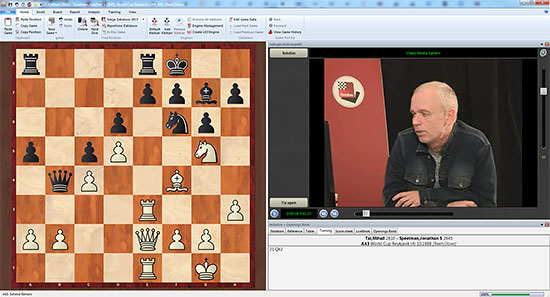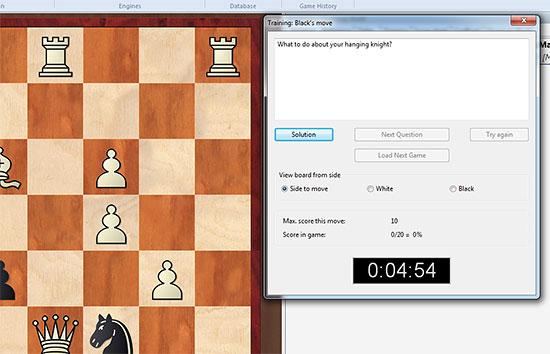 There are few if any players that fascinate or delight quite as much as Mikhail Tal. While some may incite greater admiration or even respect, the very idea of imagination and fantasy are linked to the 8th World Champion's name like no other. It was with great pleasure that I saw ChessBase's choice of the Magician from Riga as their second DVD in the Master Class series, but I must admit I did have a bit of hesitation. The reason is not because I feared they would botch it, since to be honest I thought that even an ABC approach, by the numbers would be fine since Tal's masterpieces would shine through almost anything. No, the hesitation came because I had already read his biography and many works on him, and I wasn't really sure whether I would get anything concrete from this other than a new addition to my collection.
There are few if any players that fascinate or delight quite as much as Mikhail Tal. While some may incite greater admiration or even respect, the very idea of imagination and fantasy are linked to the 8th World Champion's name like no other. It was with great pleasure that I saw ChessBase's choice of the Magician from Riga as their second DVD in the Master Class series, but I must admit I did have a bit of hesitation. The reason is not because I feared they would botch it, since to be honest I thought that even an ABC approach, by the numbers would be fine since Tal's masterpieces would shine through almost anything. No, the hesitation came because I had already read his biography and many works on him, and I wasn't really sure whether I would get anything concrete from this other than a new addition to my collection.
When I saw the contents, following the structure from the first volume on Bobby Fischer, I almost skipped the parts on openings by Rogozenco, since Tal was not exactly famous for epic opening preparation, preferring to rely on his amazing talent, but decided to see what the grandmaster had to say anyhow. I am so glad I did, since I found Rogozenco's presentation quite the eye-opener, whetting my appetite for the rest.
Although much has been made of the rematch and Tal’s poor health contributing to his loss in 1961, Rogozenco points out in his analysis that insomuch as health affected over-the-board performance, there were other issues, perhaps even more important: his opening preparation. Tal’s opening issues can be seen straight from the rather catastrophic numbers: in the first fifteen games in which Tal had black eight times, he scored only one draw and seven losses. Though one could still try to make a case for health, the fact is he struggled terribly in the opening, and this did nothing to help in his subsequent battles at the board. Rogozenco also points out that there were fundamental differences in Tal’s approach to opening preparation, beyond the openings themselves.

Dorian Rogozenco gave a first-class presentation and dissection
In the first match, the Magician had adopted a far more flexible setup, allowing himself to adapt as the situation called for, seeking positions he felt comfortable with even when his knowledge of the line was not perfect. In the second match, he relentlessly opened with 1.e4 despite having no luck against Botvinnik’s Caro-Kann, and he stubbornly played the Nimzo-Indian with Black despite the results and despite the fact the positions clearly suited Botvinnik far better than Tal. Naturally there is no one reason why a match such as this is lost, but clearly the opening preparation in 1961 had a heavy influence on the outcome.
Michael Marin gives a five part presentation of Tal’s strategic play, a facet that is not usually connected with the world champion’s play, but of course should have been. After all, Tal continued to be a force to reckon with at the highest levels for decades after his championship match, and there is no way he could have sustained this purely on the merits of mindboggling tactics.

Marin shows how Tal caught Botvinnik offguard with his positional sense at this turning
point in their match in 1960
Marin explains how the 11th game of the first Botvinnik-Tal match proved to be a turning point, as Tal outplayed his veteran opponent in fine positional play, precisely where the reigning champion had expected to dominate. As he grew older, his strategic play grew further refined, and 20 years later was occasionally producing such strategic masterpieces that he commented he could give the younger Tal of the 60s a few lessons. This was further shown in a positional tour-de-force as he outplayed Timman in a fine game in the 1985 Candidates match.
When it comes to tactics, one could say that Oliver Reeh, who does a fine job of choosing 20 examples from Tal’s games, had it the hardest. The reason is obviously not because examples are hard to find, but because there are simply so many. Reeh must then find a way to combine some of the Magician’s greatest masterpieces with lesser known ones to keep it interesting to viewers who have seen the most famous ones.

Oliver Reeh gave a fine presentation of the chosen combinations. Though he only presents
20 in the video, there are 245 training questions found on the DVD.
Personally, I was familiar with quite a number of them, but even so it was fun reviewing them as well as trying my hand at the ones I did not know. Each was broken down into several parts in which we are given a prelude to the key position, and asked to solve it little by little, since Tal’s combinations rarely involved a one-two punch, but instead more often looked like the Tasmanian Devil’s attacks from Looney Tunes.
Mikhail Tal unleashing one of his attacks

Still, if your appetite for combinations was not satisfied, worry not as there is a collection
of 245 training questions to test your hand at
Finally we reach the irrepressible Karsten Mueller who never ceases to share his enthusiasm and erudition for the endgame. By default, the program was set with the moves in notation, but it quickly becomes clear that Mueller plans to use these as tests before giving the solutions. There is no obligation of course, but if you change the tab to Training, he will pause long enough for you to pause the video and try to find the answer yourself. Mueller divides the 12 videos into six representing magic moments in endgames, of which a number are attributed to him, some rook endgames, and finally three famous endgames by Mischa shared and explained to the viewer.

Karsten Mueller always manages to keep endgames interesting even for non-aficionados
The DVD would hardly be complete without a database of Tal’s games, and needless to say, it is there together with the complete crosstables of all the tournaments and matches he participated in. Not only will you find 2900 games by the great champion, starting with a simul game he played as a child in 1948, but every commented version that appears in the Megabase will also be found there, including notes by Alburt, Tal himself, Dolmatov, Euwe, Ftacnik, and even Kasparov to name a few.

2900 games of Tal, every crosstable known, and hundreds commented
Tal is Tal, and frankly it would have taken something truly terrible to spoil my pleasure in viewing this. Needless to say that was not the case, and I was quite impressed by the quality of the work done by the contributors. Rogozenco’s thorough investigation of Tal’s opening play throughout his career was both fascinating and revealing, and it made me revise my previous assumptions on what went wrong during the 1961 match, which is far too often summarily dismissed as ‘Tal was sick’.
It is completed by tons of commented games and hundreds of training positions to work out, making this really quite close to the ultimate gift to any fan of Tal. I give it a hearty thumbs up.
Master Class Vol. 2: Mikhail Tal can be bought in the ChessBase shop


















 There are few if any players that fascinate or delight quite as much as Mikhail Tal. While some may incite greater admiration or even respect, the very idea of imagination and fantasy are linked to the 8th World Champion's name like no other. It was with great pleasure that I saw ChessBase's choice of the Magician from Riga as their
There are few if any players that fascinate or delight quite as much as Mikhail Tal. While some may incite greater admiration or even respect, the very idea of imagination and fantasy are linked to the 8th World Champion's name like no other. It was with great pleasure that I saw ChessBase's choice of the Magician from Riga as their 










